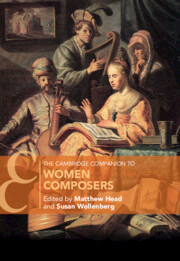Book contents
- The Cambridge Companion to Women Composers
- Cambridge Companions to Music
- The Cambridge Companion to Women Composers
- Copyright page
- Dedication
- Contents
- Figures
- Music Examples
- Contributors
- Acknowledgements
- Abbreviations
- Prologue
- Part I Themes in Studying Women Composers
- Part II Highlighting Women Composers before 1750
- Part III Women Composers circa 1750–1880
- Part IV Women Composers circa 1880–2000
- 12 First-Wave Feminism and Professional Status
- 13 Women Composers, Experimentalism, and Technology, 1945–80
- 14 Vibrations
- Epilogue
- Bibliography
- Index
- References
13 - Women Composers, Experimentalism, and Technology, 1945–80
from Part IV - Women Composers circa 1880–2000
Published online by Cambridge University Press: 23 May 2024
- The Cambridge Companion to Women Composers
- Cambridge Companions to Music
- The Cambridge Companion to Women Composers
- Copyright page
- Dedication
- Contents
- Figures
- Music Examples
- Contributors
- Acknowledgements
- Abbreviations
- Prologue
- Part I Themes in Studying Women Composers
- Part II Highlighting Women Composers before 1750
- Part III Women Composers circa 1750–1880
- Part IV Women Composers circa 1880–2000
- 12 First-Wave Feminism and Professional Status
- 13 Women Composers, Experimentalism, and Technology, 1945–80
- 14 Vibrations
- Epilogue
- Bibliography
- Index
- References
Summary
Speaking at the start of Sisters with Transistors (2020), Lisa Rovner’s documentary film on women working in electronic music, the New York-based composer and software engineer Laurie Spiegel (b. 1945) identifies, not, as we might expect, the power of a tape machine to rework, with radical and infinite possibility, the sound palette available to the composer, but rather its promise to change the social and economic structure of music, to break apart gender differentials, and to explode power structures. This, first and foremost, is the emancipatory promise of machines that make music.
Spiegel’s musical education encompassed elements of a conventional compositional training followed by an early, and lengthy, immersion in the New York electronic studios created by Morton Subotnick in the late 1960s, and then at the Bell Telephone Laboratories, nearby in New Jersey, where she developed software for computer graphics.2
- Type
- Chapter
- Information
- The Cambridge Companion to Women Composers , pp. 250 - 269Publisher: Cambridge University PressPrint publication year: 2024

